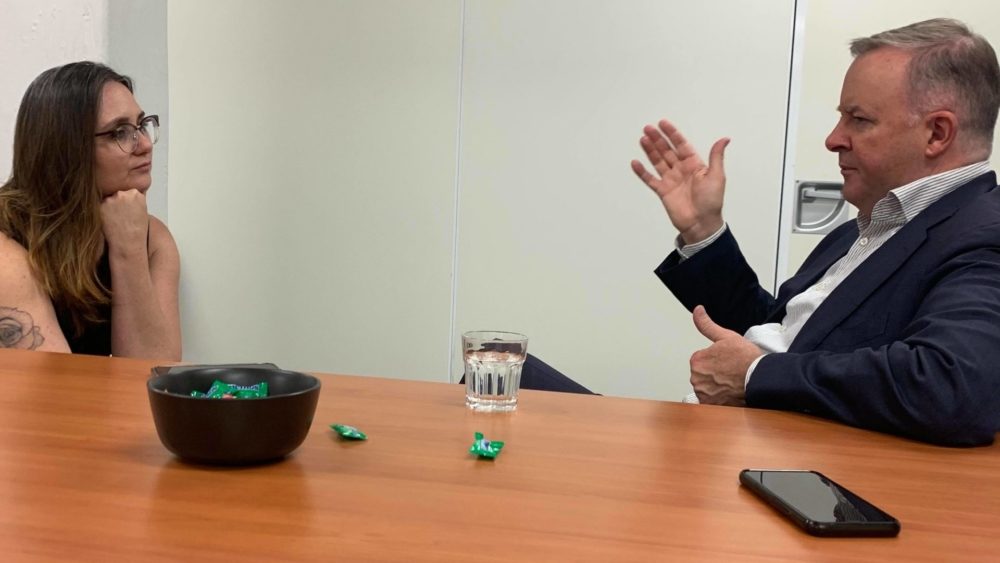“Respect, not condescension” was the message of the day from Opposition Leader Anthony Albanese for Labor Party faithfuls in Sydney today.
The Labor Leader addressed attendees at ‘Towards 2022: Ideas for Labor and Australia’, a two-day conference organised by the Chifley Research Centre.
“If you have confidence in your ideas, you have nothing to fear by debating them.” – Anthony Albanese
“We need to rebuild our capacity for constructive national conversations about the big issues” he said. “You can hear other people’s point of view without necessarily compromising your own.”
“If you have confidence in your ideas, you have nothing to fear by debating them,” he told Labor members, encouraging them to engage in meaningful, civil debates at every opportunity – without becoming caught in culture wars, particularly those online.
“Take a step back from the social media precipice,” Albanese said. “Passion is good, trolling is bad.”
“What we need is a little less anger and a little less outrage and maybe even a little less volume.”
Speaking to Eternity after he addressed the conference crowd, it’s evident the Labor leader wants to build bridges with Christian voters – identified in their post-election debrief as one group Labor failed to reach.
Asked why that happened, Albanese replied by first qualifying that not all Christians voted the same way. But he conceded: “There’s no doubt that for some they felt as though we were not representing their views.”
“I think the marriage equality issue meant that some people who regarded that very strongly were alienated from the political process and, clearly, we need to do much better.”
Tricky issues require greater understanding
Albanese appears to be leading the way, attempting to understand Christian voters. Even on some of the tricky issues Eternity was able to cover with Albanese today, such as same-sex marriage, abortion, religious discrimination and asylum seeker policy.
“I strongly support a woman’s right to choose but I also am a strong supporter of conscience votes,” he told Eternity when asked about abortion, a topic that became a federal election issue for Christians, despite mostly being covered in state legislation.
“People regard those issues, I think, as being very personal,” Albanese said. “Certainly I respect people’s views on it which is why I’ve always supported a conscience vote on a whole range of issues, including on marriage equality.
“That interaction between civil society and faith, I think we need more understanding of.” – Anthony Albanese
“I’ve supported a conscience vote even though I was one of the strongest supporters [of same-sex marriage] in the Parliament – and the earliest supporters of equal rights.”
“I think what we have to do when we consider these issues as a political party is to put ourselves in the perspective of others. So, for example, on marriage, if you regard marriage as actually not being a civil institution but as something that is ordained by God, then, if you think about that perspective, then it’s not surprising that some people have the view that they do.”
Rather than people simply being divided over differences between secular laws and religious beliefs, Albanese said “it’s that interaction between civil society and faith that I think we need more understanding of.”
“Those issues can be very complex.
Religious Discrimination Act?
“The fact that the government has been unable to come up with a Religious Discrimination Act – even though this process began with Philip Ruddock’s appointment [about] three years ago – and [that] we still don’t have the new exposure draft, shows these issues are quite complex.”
So does Albanese support a Religious Discrimination Act in principle? Like most people,’ he will “wait and see what they come up with” before deciding.
“I very much support people’s right to practice their faith but we need to make sure as well that removing other discrimination, or perceived discrimination, against one group of people doesn’t lead to discrimination in others as well.”
He noted that theologians have raised the idea of putting the issue “in the positive” – i.e. “having a right to religious liberty”, so “a positive measure going forward might be something that emerges from this process.”
Accountability, not anti-Hillsong
As Albanese keeps his attention turned to the Labor Party’s relationship with voters of faith, Eternity asked him about a recent example of possible ALP bias against a denomination.
A few months ago, the Labor Party repeatedly questioned Prime Minister Scott Morrison over reports in The Washington Post that he requested Hillsong global pastor Brian Houston be invited to the White House.
Some may have viewed this as indicating an anti-Hillsong bias in the Labor Party, but Albanese emphatically rejected that notion.
“Politicians have to be accountable in public life.” – Anthony Albanese
“They’re very different issues – the issue with Scott Morrison is his failure to be accountable,” he said about the ALP going after the Houston/Morrison incident.
To further clarify his point about accountability in leadership, Albanese said that if someone asked him a straightforward question and he responded with “that’s just gossip,” he knows he would get asked it again.
“The reason why it became an issue is because of Scott Morrison’s avoidance of the question and, indeed, the implied statement that could be read into it that Brian Houston hadn’t been invited.”
“Politicians have to be accountable in public life and Scott Morrison has a whole pattern of, when asked questions, saying ‘it’s just gossip’ or ‘it’s in the Canberra bubble’ and just ignoring. It’s a different level of avoidance of accountability from what we are used to see.”
Albanese believed it’s “something that people are reacting about” because they see a similar lack of accountability playing out with other world leaders and are concerned it will happen in Australia.
“It then goes to issues as well. So [the question of] are Australia’s emissions going up or down becomes something that isn’t answered. [Or] is the science of climate change real?
“And the answer to that is ‘yes.’”
ALP’s asylum seeker alternative?
The leader had just covered similar concerns in his conference address, reiterating the ALP’s commitment to accountability and transparency. He also re-iterated the party’s commitment to freedom of the press, the right to protest, freedom of association (unionism) and called for a national integrity commission.
But if Albanese is aware that these values – integrity, honestly, accountability – are also shared with many Christians, he doesn’t mention it.
“You need people coming by boat to have offshore processing … The objective should be to avoid that.” – Anthony Albanese
Another issue many Christian voters are particularly concerned about is asylum seeker policy. Eternity asked Albanese if Labor had a real alternative proposal heading into the election?
“We had a comprehensive plan which was about regional settlement, which was about keeping some of the measures in place,” he responded today.
But not to close offshore detention?
“Well, get people off, and then it stops. And processing of people – increased funding to the UNHCR, increased numbers of refugees. Regional processing that avoids any incentive for people to get on boats …
“You need people coming by boat to have offshore processing … The objective should be to avoid that.
“How do you do that? You work for regional settlement, you work through the UNHCR, you put in place mechanisms that do stop the boats coming but also, therefore, you can use the money that is saved from the incredibly expensive offshore processing system that’s in place.”
Re-engage with voters of faith
These kinds of areas of shared policy were covered by the conference in an afternoon session called “Talking to Voters of Faith: How should we engage with voters of faith”, facilitated by the ABC journalist Andrew West.
“Should Labor bother to engage with faith voters?” West asked panellist Kate Harrison Brennan, Chief Executive Officer of Anglican Deaconess Ministries.
“It’s an opportunity to re-engage,” she corrected him.
Fellow panellist NSW Labor Member for Lakemba Jihad Dib agreed: “There’s a perception that Labor is at war with religion”.
In Dib’s opinion, though, there’s actually just a few “chinks in the armour” that “conservatives are using to their advantage.”
“There’s been little reflection on political strategy by the church …” – Kate Harrison Brennan
Pentecostal pastor and founder of Welcoming Australia Brad Chilcott was also on the panel. He said there already are faith voters in the Labor party as members, staffers and union leaders but many of them keep their faith quiet. He believed the Labor Party needs to find inclusive language that encourages these people to engage with their whole selves, rather than feeling they need to compartmentalise their lives.
Fellow panellist Dr Rosemary Hancock, a sociologist of religion, noted that in order for faith voters to reengage with Labor, and really say what matters to them, the party needed to develop trusting relationships.
“When the first thing people hear you say is ‘you’re a bigot’, you don’t get to say the next thing,” Chilcott added. He went on to describe the building of relationships with faith voters as “the hard work you [Labor party members] can’t dodge”.
But it’s not only the Labor Party that has work to do, according to Harrison Brennan.
“We’re here because we’re concerned about the question ‘does Labor have a religion problem?’ But working within Christian community myself, I would say the church has a ‘politics problem’.”
“We’re not aware enough of when we’re being co-opted or commodified. We’re not thinking enough about what is our position in society and how do we relate politically. There’s been little reflection on political strategy by the church and very little depth in terms of public theology.”
That, she says, is a “very dangerous” place the church should never be in.
Email This Story
Why not send this to a friend?


